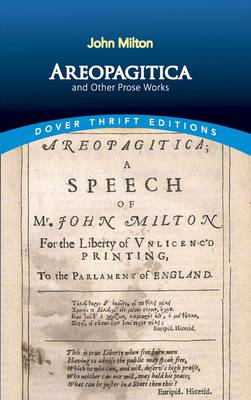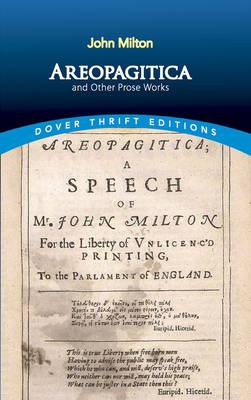
Bedankt voor het vertrouwen het afgelopen jaar! Om jou te bedanken bieden we GRATIS verzending (in België) aan op alles gedurende de hele maand januari.
- Afhalen na 1 uur in een winkel met voorraad
- In januari gratis thuislevering in België
- Ruim aanbod met 7 miljoen producten
Bedankt voor het vertrouwen het afgelopen jaar! Om jou te bedanken bieden we GRATIS verzending (in België) aan op alles gedurende de hele maand januari.
- Afhalen na 1 uur in een winkel met voorraad
- In januari gratis thuislevering in België
- Ruim aanbod met 7 miljoen producten
Zoeken
Omschrijving
An uncompromising defender of liberty as well as a sublime poet, John Milton published the "Areopagitica" in 1644, at the height of the English Civil War. The impetus arose from Parliament's Licensing Order, which censored all printed materials and ultimately led to arrests, book burnings, and other authoritarian abuses. Milton's polemic, strengthened by biblical and classical allusions, remains enduringly significant and ranks among the world's most eloquent defenses of the right to free speech.
In addition to the "Areopagitica," this collection of Milton's most significant prose works includes "Of Education," a tract on educational reform; "Meditation Upon Divine Justice and The Death of King Charles the First," a rationale for the overthrow of the monarchy; "The Doctrine and Disciple of Divorce," in which the author urges the enactment of a virtually unheard-of reform allowing divorce for incompatibility and the right of remarriage; and "Autobiographical Extracts," featuring highlights from Milton's memoirs.
In addition to the "Areopagitica," this collection of Milton's most significant prose works includes "Of Education," a tract on educational reform; "Meditation Upon Divine Justice and The Death of King Charles the First," a rationale for the overthrow of the monarchy; "The Doctrine and Disciple of Divorce," in which the author urges the enactment of a virtually unheard-of reform allowing divorce for incompatibility and the right of remarriage; and "Autobiographical Extracts," featuring highlights from Milton's memoirs.
Specificaties
Betrokkenen
- Auteur(s):
- Uitgeverij:
Inhoud
- Aantal bladzijden:
- 192
- Taal:
- Engels
- Reeks:
Eigenschappen
- Productcode (EAN):
- 9780486811253
- Verschijningsdatum:
- 16/11/2016
- Uitvoering:
- Paperback
- Formaat:
- Trade paperback (VS)
- Afmetingen:
- 124 mm x 203 mm
- Gewicht:
- 136 g

Alleen bij Standaard Boekhandel
+ 11 punten op je klantenkaart van Standaard Boekhandel
Beoordelingen
We publiceren alleen reviews die voldoen aan de voorwaarden voor reviews. Bekijk onze voorwaarden voor reviews.









